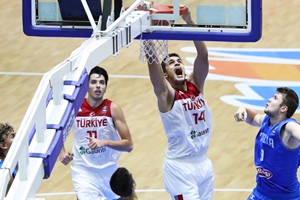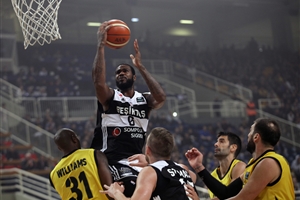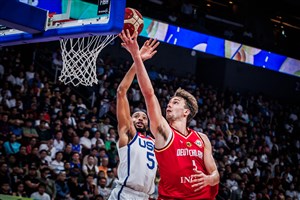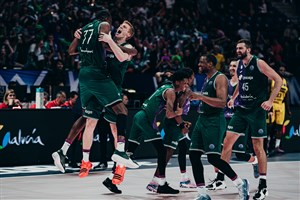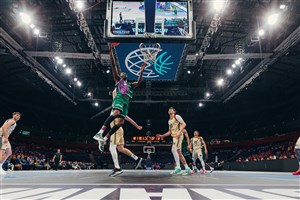
Come together, get the Cup
MELBOURNE (Paulo Kennedy's View from Downunder) - It's a good news week Downunder with the news that Basketball Australia (BA) is bidding to host the FIBA Basketball World Cup 2023.
Obviously there is a long way to go before they are a serious chance, but I like the fact they are at least heading down that path, suggesting they are serious about attracting a major event that can capitalise on basketball’s growing popularity in this country.
BA has also looked into the possibility of hosting a FIBA Women's Basketball World Cup and a FIBA Asia Cup - which don't incur quite the same costs as the world's biggest basketball event - but now they’ve decided they want to attend the big dance.
For those who haven't caught up, representative from 11 countries - Australia, Argentina, Germany, Hong Kong, Israel, Japan, Philippines, Poland, Russia, Serbia and Turkey attended a two-day workshop in Geneva on what is involved in running a World Cup.
.@FIBA holds workshop on hosting FIBA Basketball World Cup 2023 with 11 national federations - https://t.co/RvJGKnbn0q pic.twitter.com/Mg6iayBbsB
— FIBA media (@FIBA_media) November 1, 2016
BA chief Anthony Moore emerged from the meeting buoyed, but also pragmatic when he spoke to Fairfax's Roy Ward about his organisation's approach and the reason Australia could make a strong case.
"We will get the formal bid documents and find out what needs to be included in the bid - what is of note is the government requirements," he said. "Our federal government has experts in their sport and major events section who have been involved in the Asian Cup, Cricket World Cup and Netball World Cup so the federal government is well placed to assist us.
"Now we have to find out what the ask is and come back and talk to government."
Often in life when you want something, you have to go after it more than once before you land it. So even if this bid is unsuccessful, it could put Australia squarely in the game for hosting future tournaments.
Of course, the bad news under that theory is the Philippines will be very hard to top for the 2023 rights, after making what I'm told was a very impressive bid for the 2019 version, only to fall short behind China.
After their hugely-successful hosting of the FIBA Asia Cup in 2013, the improved performances of their national team and the fast growth of their national economy, the Philippines is shaping as an important market for FIBA to grow the game outside of Europe.
With the 2013 tournament and this year's Olympic Qualifying Tournament under their belts, they've shown they can deliver world-class hoops events with the added bonus of having arguably the most basketball-addicted population on the planet.
Given that for the first time FIBA is open to having their flagship event hosted by more than one country, exploring a partnership with one of our closest basketball neighbours seems a wise strategy for BA.
The new 32-team format of the World Cup involves eight groups of four teams - by my count 48 games in the preliminary stage alone - which means at the very least four host cities will be needed, but preferably eight in my opinion.
As I wrote earlier this year, I would ultimately like to see hosting of the World Cup shared amongst eight host countries, with the opening group rounds all played in the June/July window before the main event in September. That would have benefits such as half those 48 games being in front of a home crowd, and games potentially being played around the clock, increasing media coverage for the World Cup and everything it has to offer.
Of course, that's an idea for down the track, a more modest co-hosting model needs to be explored and refined first. It is likely such a bid will come from Europe, but one from more geographically distant countries could also have appeal.
An example where groups are split between Australia and the Philippines - with perhaps even the Tall Blacks playing their pool games in New Zealand - is a workable model, and a first step to a wider distribution of hosting rights.
Where both countries have some weaknesses heading into bidding process, together they halve the burden of the event and can present a very strong case.
The World Cup aside, with Asia and Oceania coming together, it makes sense for Australia and the Philippines to build a strong relationship. For the Asian region to lift itself to compete with Europe and the Americas, its strongest pillars need to work together.
A bid highlighting such strong and strategic cooperation should be a welcome one from FIBA's point of view.
The other thing going in Australia's favour is the current sight of full or near-full stadiums at NBL games right around the country and over The Ditch in Auckland, as FIBA understandably wants the World Cup played in front of big crowds.
That's the other partnership BA needs to work on ahead of making the bid for the World Cup next year - becoming genuine allies with the NBL.
For many reasons, the relationship between governing body and professional league in Australia has been a roller-coaster ride.
However, with BA under Moore showing they can attract big crowds to events like the FIBA Oceania Championship, and the NBL under Larry Kestelman showing they are a force to be reckoned with, a combination of these two bodies could be exactly what’s needed to produce a World Cup bid that outdoes the big boys.
The NBL and BA working together is also a much better chance at solidifying a relationship with the Philippines, and China, that all relevant parties are comfortable with and that delivers benefits to multiple layers of sport in this country.
Come together, and maybe get the Cup. Stay at arm's length, and maybe no one gets what they're dreaming of.
Paulo Kennedy
FIBA
FIBA's columnists write on a wide range of topics relating to basketball that are of interest to them. The opinions they express are their own and in no way reflect those of FIBA.
FIBA takes no responsibility and gives no guarantees, warranties or representations, implied or otherwise, for the content or accuracy of the content and opinion expressed in the above article.

